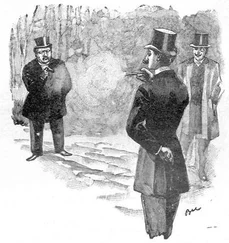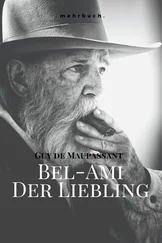Norbert de Varenne interrupted: "Yes, they would know everything, except agriculture. They would speak Arabic, but they would not know how to transplant beet–root, and how to sow wheat. They would be strong in fencing, but weak in the art of farming. On the contrary, the new country should be opened to everyone. Intelligent men would make positions for themselves; the others would succumb. It is a natural law."
A pause ensued. Everyone smiled. Georges Duroy, startled at the sound of his own voice, as if he had never heard it, said:
"What is needed the most down there is good soil. Really fertile land costs as much as it does in France and is bought by wealthy Parisians. The real colonists, the poor, are generally cast out into the desert, where nothing grows for lack of water."
All eyes turned upon him. He colored. M. Walter asked: "Do you know Algeria, sir?"
He replied: "Yes, sir, I was there twenty–eight months." Leaving the subject of colonization, Norbert de Varenne questioned him as to some of the Algerian customs. Georges spoke with animation; excited by the wine and the desire to please, he related anecdotes of the regiment, of Arabian life, and of the war.
Mme. Walter murmured to him in her soft tones: "You could write a series of charming articles."
Forestier took advantage of the situation to say to M. Walter: "My dear sir, I spoke to you a short while since of M. Georges Duroy and asked you to permit me to include him on the staff of political reporters. Since Marambot has left us, I have had no one to take urgent and confidential reports, and the paper is suffering by it."
M. Walter put on his spectacles in order to examine Duroy. Then he said: "I am convinced that M. Duroy is original, and if he will call upon me tomorrow at three o'clock, we will arrange matters." After a pause, turning to the young man, he said: "You may write us a short sketch on Algeria, M. Duroy. Simply relate your experiences; I am sure they will interest our readers. But you must do it quickly."
Mme. Walter added with her customary, serious grace: "You will have a charming title: 'Souvenirs of a Soldier in Africa.' Will he not, M. Norbert?"
The old poet, who had attained renown late in life, disliked and mistrusted newcomers. He replied dryly: "Yes, excellent, provided that it is written in the right key, for there lies the great difficulty."
Mme. Forestier cast upon Duroy a protecting and smiling glance which seemed to say: "You shall succeed." The servant filled the glasses with wine, and Forestier proposed the toast: "To the long prosperity of 'La Vie Francaise.'" Duroy felt superhuman strength within him, infinite hope, and invincible resolution. He was at his ease now among these people; his eyes rested upon their faces with renewed assurance, and for the first time he ventured to address his neighbor:
"You have the most beautiful earrings I have ever seen."
She turned toward him with a smile: "It is a fancy of mine to wear diamonds like this, simply on a thread."
He murmured in reply, trembling at his audacity: "It is charming—but the ear increases the beauty of the ornament."
She thanked him with a glance. As he turned his head, he met Mme. Forestier's eyes, in which he fancied he saw a mingled expression of gaiety, malice, and encouragement. All the men were talking at the same time; their discussion was animated.
When the party left the dining–room, Duroy offered his arm to the little girl. She thanked him gravely and stood upon tiptoe in order to lay her hand upon his arm. Upon entering the drawing–room, the young man carefully surveyed it. It was not a large room; but there were no bright colors, and one felt at ease; it was restful. The walls were draped with violet hangings covered with tiny embroidered flowers of yellow silk. The portieres were of a grayish blue and the chairs were of all shapes, of all sizes; scattered about the room were couches and large and small easy–chairs, all covered with Louis XVI. brocade, or Utrecht velvet, a cream colored ground with garnet flowers.
"Do you take coffee, M. Duroy?" Mme. Forestier offered him a cup, with the smile that was always upon her lips.
"Yes, Madame, thank you." He took the cup, and as he did so, the young woman whispered to him: "Pay Mme. Walter some attention." Then she vanished before he could reply.
First he drank his coffee, which he feared he should let fall upon the carpet; then he sought a pretext for approaching the manager's wife and commencing a conversation. Suddenly he perceived that she held an empty cup in her hand, and as she was not near a table, she did not know where to put it. He rushed toward her:
"Allow me, Madame."
"Thank you, sir."
He took away the cup and returned: "If you, but knew, Madame, what pleasant moments 'La Vie Francaise' afforded me, when I was in the desert! It is indeed the only paper one cares to read outside of France; it contains everything."
She smiled with amiable indifference as she replied: "M. Walter had a great deal of trouble in producing the kind of journal which was required."
They talked of Paris, the suburbs, the Seine, the delights of summer, of everything they could think of. Finally M. Norbert de Varenne advanced, a glass of liqueur in his hand, and Duroy discreetly withdrew. Mme. de Marelle, who was chatting with her hostess, called him: "So, sir," she said bluntly, "you are going to try journalism?" That question led to a renewal of the interrupted conversation with Mme. Walter. In her turn Mme. de Marelle related anecdotes, and becoming familiar, laid her hand upon Duroy's arm. He felt that he would like to devote himself to her, to protect her—and the slowness with which he replied to her questions indicated his preoccupation. Suddenly, without any cause, Mme. de Marelle called: "Laurine!" and the girl came to her. "Sit down here, my child, you will be cold near the window."
Duroy was seized with an eager desire to embrace the child, as if part of that embrace would revert to the mother. He asked in a gallant, yet paternal tone: "Will you permit me to kiss you, Mademoiselle?" The child raised her eyes with an air of surprise. Mme. de Marelle said with a smile: "Reply."
"I will allow you to–day, Monsieur, but not all the time."
Seating himself, Duroy took Laurine upon his knee, and kissed her lips and her fine wavy hair. Her mother was surprised: "Well, that is strange! Ordinarily she only allows ladies to caress her. You are irresistible, Monsieur!"
Duroy colored, but did not reply.
When Mme. Forestier joined them, a cry of astonishment escaped her: "Well, Laurine has become sociable; what a miracle!"
The young man rose to take his leave, fearing he might spoil his conquest by some awkward word. He bowed to the ladies, clasped and gently pressed their hands, and then shook hands with the men. He observed that Jacques Rival's was dry and warm and responded cordially to his pressure; Norbert de Varenne's was moist and cold and slipped through his fingers; Walter's was cold and soft, without life, expressionless; Forestier's fat and warm.
His friend whispered to him: "To–morrow at three o'clock; do not forget."
"Never fear!"
When he reached the staircase, he felt like running down, his joy was so great; he went down two steps at a time, but suddenly on the second floor, in the large mirror, he saw a gentleman hurrying on, and he slackened his pace, as much ashamed as if he had been surprised in a crime.
He surveyed himself some time with a complacent smile; then taking leave of his image, he bowed low, ceremoniously, as if saluting some grand personage.
Chapter III.
First Attempts
When Georges Duroy reached the street, he hesitated as to what he should do. He felt inclined to stroll along, dreaming of the future and inhaling the soft night air; but the thought of the series of articles ordered by M. Walter occurred to him, and he decided to return home at once and begin work. He walked rapidly along until he came to Rue Boursault. The tenement in which he lived was occupied by twenty families—families of workingmen—and as he mounted the staircase he experienced a sensation of disgust and a desire to live as wealthy men do. Duroy's room was on the fifth floor. He entered it, opened his window, and looked out: the view was anything but prepossessing.
Читать дальше











